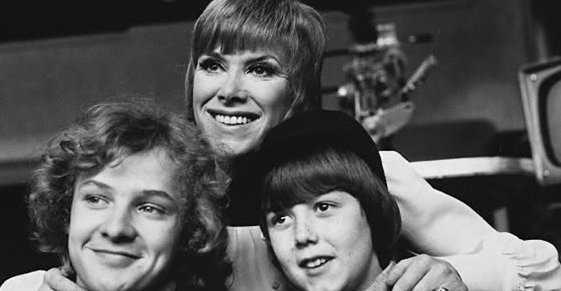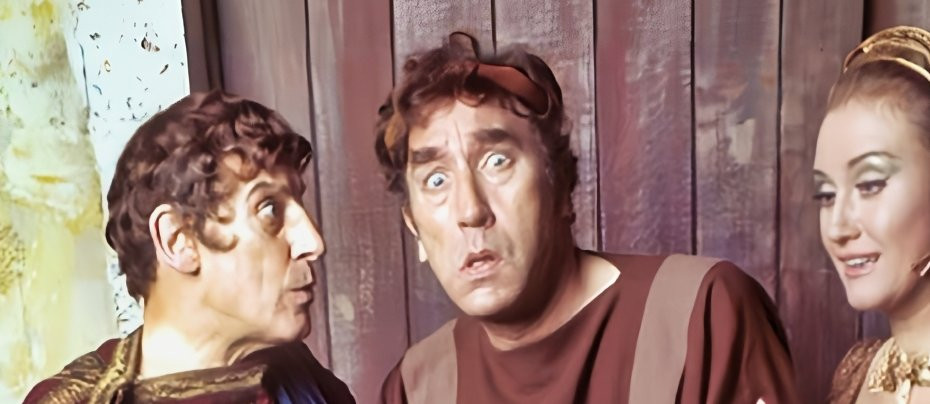
Up Pompeii!
1970 - United Kingdom“Ah yes, now…wait a minute….no! Oh, please yourselves! The Prologue...”
Up Pompeii! Review by Brian Slade
For a comedian like Frankie Howerd, with a style of speaking directly to an audience, finding a successful scripted sitcom was always likely to be a challenge. Despite success with That Was The Week That Was, by the late 1960s the closest Frankie had come to a scripted success was in the theatre performing in A Funny Thing Happened on the Way to the Forum, a hugely successful farce in which he played a slave attempting to earn his freedom with a little matchmaking for his master. In 1969, an opportunity came Howerd’s way that was not dissimilar to that huge stage success and would give him his first sitcom success. That show was Up Pompeii!
Howerd had returned to the UK from an unsuccessful assault on Broadway. Head of Comedy at the BBC, Michael Mills, had taken a brief break with Tom Sloan, Head of Light Entertainment at the time. On their travels, they took in a visit to Pompeii where according to Barry Took when speaking to Howerd’s biographer Graham McCann, Mills remarked, ‘I expect to see Frankie Howerd come loping around the corner,’ an image caused by Howerd’s West End efforts. A comparatively flippant aside turned out to be the seeds of Frankie’s next big project. Mills forwarded some thoughts and suggestions to Carry On… writer Talbot Rothwell, specifically with Howerd in mind. Rothwell was now well established as the lead writer of the Carry On… films and had taken them in a far more innuendo-laden direction than earlier writer Norman Hudis. His style was perfect to come up with something suited to Howerd’s comedy.
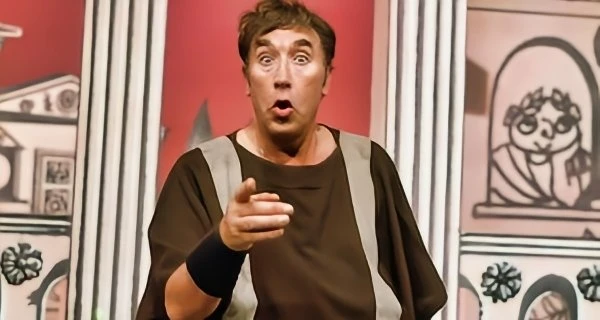
Once the pilot episode of Up Pompeii! was aired under the Comedy Playhouse umbrella, it was clear that the BBC had a hit on their hands. So gratified were they by audience reception and viewing figures that they swiftly commissioned two series at once. Howerd played the slave Lurcio, a variation on Pseudolus, the slave at the centre of …Forum. The scripts were skimpy to say the least when it came to plotlines. Lurcio would invariably be attempting to pacify his master or one of his master’s family’s wishes or juggle with schemes and treachery, often involving sins of the flesh. His master, Ludicrous Sextus (Max Adrian and later Wallas Eaton) is married to the far wiser Ammonia (Elizabeth Larner), who satisfies her ample carnal desires with almost anybody. The pair have two offspring: Erotica (Georgina Moon) who consistently needs Lurcio’s discretion when keeping secrets from her parents, and the effeminate son Nausius (Kerry Gardner) whose woeful poetry when he’s in a romantic mood shows Rothwell at his most creative!
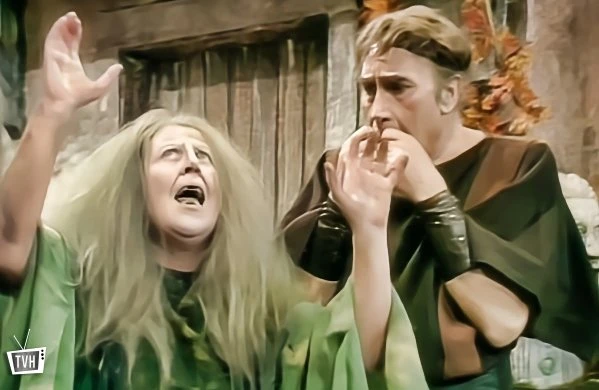
The thin plots are somewhat secondary to the success of Up Pompeii! as the whole programme is merely a vehicle for Rothwell’s innuendo and Howerd’s mastery at controlling an audience. Each episode would invariably involve Howerd attempting to deliver a prologue direct to camera, rarely with any success. Interruptions abound from the leading players, or from the harbinger of doom Senna the Soothsayer (Jeanne Mockford) who constantly warns of impending disasters. In the first series, Willie Rushton is also to be seen as a witty God-like character, Plautus, casting bits of wisdom from among the clouds.
In the first series, David Croft was entrusted to produce the show, a wise move given his growing reputation as a comedy genius behind the camera. It was a shrewd choice as it was he who helped work into the production the style of Howerd conducting proceedings with his prologue and story-telling, the proper sitcom element along the lines of the loose plot, and the theatrical nature of having Howerd chastise the audience for laughing in the wrong places or making dirty interpretations of the script.
As was customary for Howerd in whatever shows he appeared in, the constant ‘oh no, don’t,’ ‘now listen,’ ‘don’t laugh,’ and so forth were mostly scripted, but Croft insisted that Howerd continue on the occasion when adlibs were genuine, for once Howerd had an audience, any floundering was deemed to be comedy gold. Croft recalled that once filming began, ‘He played them as a master fisherman plays a trout. He had complete control. They loved him. He was magic.’
Up Pompeii! didn’t travel beyond those two rushed out series, both aired in 1970. However, it managed to garner quite a supporting cast of faces (and in many cases, busts) of comedy actors who would become better known elsewhere. Barbara Windsor, Mollie Sugden, Wendy Richard, Lynda Baron and Valerie Leon all made an appearance, along with male contemporaries Nicholas Smith, John Junkin, Robert Gillespie and Geoffrey Hughes.
Instead of further series, the Up Pompeii! style was simply redeployed in subsequent efforts, to considerably less success. Whoops Baghdad saw Howerd play the Wazir of Baghdad in a pale imitation of Up Pompeii!, while movie versions were churned out quickly – Up Pompeii!, Up the Chastity Belt and Up The Front offering decreasing quality as the sequence went on. A one-off special saw Croft and Rothwell at the helm again in 1975 for Further Up Pompeii!, while another same-titled revival aired on LWT in 1991. An unhappy Howerd did not enjoy the experience, and neither did the audiences. After Howerd’s death in 1992, another variation, Then Churchill Said to Me, was aired despite having sat on the shelf for 10 years unseen. While not classic Howerd, it was still a better effort than the poor LWT showing.
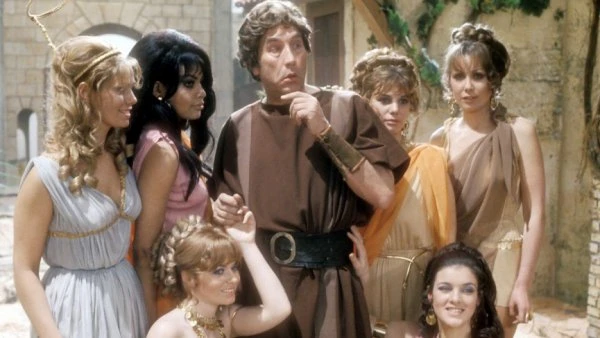
For those unlucky enough to never have seen Howerd live, the original two series of Up Pompeii! were as close as a scripted comedy could get to that experience. The plots were of no real relevance as with the freedom to talk directly into camera and berate the viewers and audience (and indeed the scriptwriters!) Howerd was largely conducting his stage show simply in a setting with other performers. Bawdy and doubtless inappropriate for some modern audiences, it was nonetheless Howerd at his best and a bit of harmless fun that is difficult to be offended by unless you really want to be.
Related Link: Up Pompeii on the Big Screen
Seen this show? How do you rate it?
Seen this show? How do you rate it?
Published on April 5th, 2024. Written by Brian Slade for Television Heaven.






